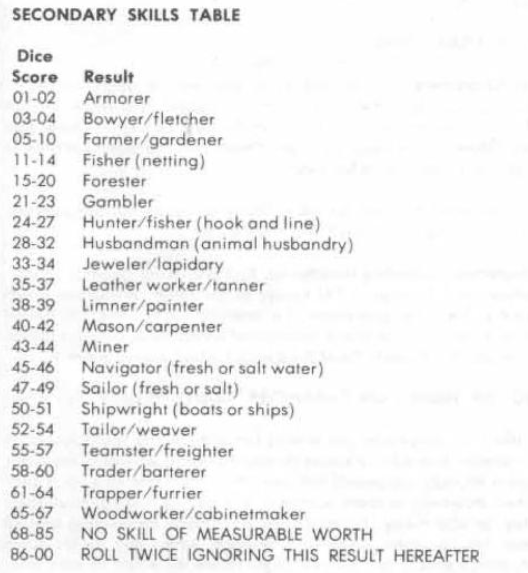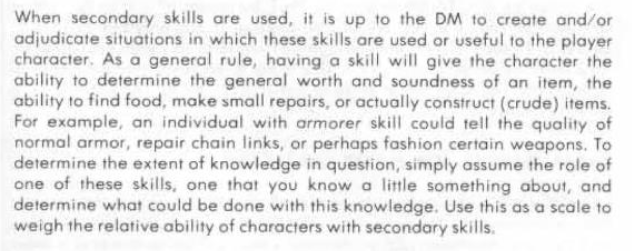Knowledge Areas are, as I pointed out earlier. are highly reminiscent of the Secondary Skills table from the AD&D 1E DMG
It's clear we're looking at the same kind of idea here: things your character knows how to do that are separate from your class. (Note the #60 outcome for V&V, one of my favorite throwaway jokes to the reader.) AD&D is more limiting in what it can do because it as seen as a secondary aspect to the character Class, which already carries professional skills.
Whereas V&V is much more open ended for GM adjudication, because the only "class" in V&V is Super-Hero, and the only professional abilities that run with that are combat and training related, other than open inventing options if you stick within your particular heroes affect/gimmick.
These are a great, open ended mechanic that feels very OSR, but can easily be improved with some newer mechanics.
The 3rd edition of V&V, Mighty Protectors, has much the same table but has examples of the types of careers the character has inside that knowledge area. It's not longer a broad skill in medicine, but a prompt to pick a career with medical aspects (Surgeon, Doctor, Nurse, Paramedic, etc.), with clearer rules in task resolution that the task is something anyone can try but your career gives you an advantage you get a +3 to your target, if it's something where untrained people have a chance having the career gives you a regular roll and everyone else is at -3 to your target, and if its something where training is essential having the career rolls normally and everyone else needs a roll of 1. That's clean enough, but it also uses a universal task resolution system, which I kinda want to avoid, and the 15% difference feels too small.
The way I've generally handled things is that having the Knowledge Area make tests one level easier. If it's something that CAN'T be done without training, now a d% vs Intelligence or Charisma is needed. If it's very difficult to do without training (d% test) it becomes easier for the trained person (d% vs. characteristic *3), and so on, until things that are a d20 save for normal people don't need a save for the trained professional.
I do like asking the player to further define their knowledge area into a career, but I think I'll take Wade Rockett's recommendation for 13th Age Backgrounds. Those are also open ended, but are best used as phrases that evoke a broader penumbra. Rather than having "Minstrel" my daughter's Bard has "Wandering minstrel who has been thrown (or chased) out of every port and waterfront on the Isles"; the background now gives a much clearer sense of what she's done, and that it could be used for reading the tolerance level of crowds and escaping angry mobs.
Requesting that phrase long explanation of the career gives the player more control over their career's penumbra, making it clearer to the GM and player what the boundaries of their careers are. This is one of the few places where I'm willing to slot some world building authority to the players, since it's confined to character creation. Once that's done, the GM is the interpreter of the background's penumbra.






No comments:
Post a Comment